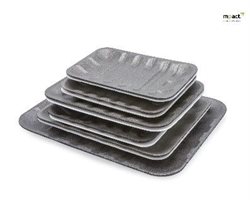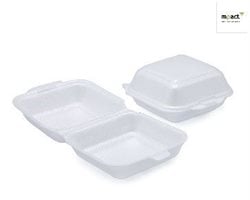Polystyrene: Supreme packaging, here to stay!

Through our extensive, countrywide distribution network, we are able to rapidly respond to our customers’ delivery needs. Our in-house design function allows us to develop products that are aligned with market trends and are optimised for the manufacturing process, ultimately benefitting you, our valued client.

All our packaging is manufactured to stringent health and safety standards. Under our BRC accreditations, we are committed and regulated to use accredited raw materials that are safe for direct food contact. Mpact Plastics is a keen participant in sustainability initiatives driven by Plastics SA and Packaging SA, and is a member of Petco, Polyco, SAVA and the Polystyrene Association.
To enquire about our polystyrene or PET products, contact us on 021 877 5500 or visit us at www.mpactversapak.co.za
1. What is polystyrene, actually?
Polystyrene, abbreviated PS, is a polymer made from the aromatic monomer styrene. Styrene is a clear, natural liquid component that occurs in foods such as coffee beans, peanuts, beef, strawberries, wheat, oats, peaches and cinnamon. Styrene is also used to help create strong, flexible, and lightweight packaging products.
2. Is styrene harmful to my health?
Styrene is harmless in the very small amounts most people might normally encounter in air or food. Styrene is approved by the US Food and Drug Administration as a food additive.
3. Is polystyrene safe to use in food packaging?
Mpact Versapak adheres to EU laws, which have approved the use of polystyrene since 1958. All our packaging is manufactured to stringent health and safety standards. Under our BRC accreditations, we are committed and regulated to use accredited raw materials that are safe for direct food contact.
4. Can polystyrene be recycled?
Yes, and it is being recycled in certain sectors. Some products, which are made from recycled polystyrene include coat hangers, seedling trays, curtain rods, cornices and skirting, outdoor furniture, décor items such as picture frames and poles and decking. The Polystyrene Association works closely with municipalities and companies to educate and encourage polystyrene recycling. For more information, please visit www.polystyrenepackaging.co.za.
5. What is expanded polystyrene, or EPS?
Expanded polystyrene is a rigid cellular plastic containing an expansion agent. When EPS is exposed to steam, it expands into a lightweight pre-foam. The pre-foam, in a bead or granular form, undergoes steam treatment to allow it to fuse together, inside a mould, to give the material the required shape and size.
6. What is expanded polystyrene, EPS, used for?
Expanded polystyrene is used in a number of applications, including food packaging, such as hot beverage cups, meat trays and as fast food containers. It is also used as a protective material in items such as cycling helmets or as protective packaging for electronics and white goods. It is widely found in the leisure industry to produce equipment such as windsurfing boards and even in the construction industry due to its insulation properties. Many people are unaware of just how many polystyrene products they use on a daily basis!
7. How can I identify polystyrene or EPS?
Polystyrene or EPS is identified by the number six plastic symbol. The marking on the packaging helps recyclers to identify what recycling processes the product requires. There are various recycling programs being set up across the country to encourage and promote the recycling of polystyrene in order to eliminate this material grade from going to landfills.
8. Why should I recycle?
Accumulation of waste is a global problem: we are running out of locations to bury synthetic waste. Overflowing landfill sites result in pollution to the adjacent areas or oceans whilst the methane gasses, released from old landfill sites, also contribute to global warming. Emission of other toxic and infectious gasses from landfill sites can also lead to respiratory ailments, if inhaled over time. Recycling leads to job creation, as more recycling plants will be required when individuals focus on recycling their household items. Whilst we know that the materials we recycle go back into certain production streams to save huge amounts of money and raw material, we should also be mindful that recycling is simply the right thing to do!
9. How can I ensure that I purchase polystyrene from a responsible converter?
Responsible converters will communicate their memberships and associations in a transparent and public manner. All our packaging is manufactured to stringent health and safety standards. Under our BRC accreditation, we are committed and regulated to use accredited raw materials that are safe for direct food contact. Mpact Plastics is a keen participant in sustainability initiatives driven by Plastics SA and Packaging SA, and is a member of Petco, Polyco, SAVA and the Polystyrene Association.
About Mpact

Mpact is the largest paper and plastics packaging and recycling business in Southern Africa with customers that include packaging converters, fruit producers, FMCG companies and other consumer and industrial packaging companies. Mpact’s integrated business model is uniquely focussed on closing the loop in plastic and paper packaging through recycling and beneficiation of recyclables. Mpact has 43 operating sites, 21 of which are manufacturing operations, located in South Africa, Namibia and Mozambique. Sales in South Africa accounted for approximately 87% of Mpact’s total revenue for the current period, while the balance was predominantly to customers in the rest of Africa. Mpact Operations (Pty) Ltd, the major subsidiary of the Group is a B-BBEE Level 1 contributor.
Mpact │011 994 5500 │ www.mpact.co.za │ az.oc.tcapm@ofni
Mpact Plastics is a leading producer of rigid plastic packaging and cling film in southern Africa. We operate out of nine production centres across the country, providing packaging from plants with relevant certifications. We service the food, beverage, personal care, home care, pharmaceutical, agricultural and retail markets. In upholding company values, and as a supporter of the circular economy, we positively contribute to industry associations, enabling various communities to participate in recycling solutions.
- The relationship between packaging and food waste 26 Mar 2024
- Innovative PET packaging clinches top accolade at IPSA Gold Pack Awards 27 Nov 2023
- Smart sustainable packaging solutions demonstrated 24 Nov 2023
- Shifting perceptions 17 Nov 2023
- Designed with purpose 26 Oct 2023
MpactMpact is the largest paper and plastics packaging and recycling business in Southern Africa. Our integrated business model is uniquely focused on closing the loop in plastic and paper packaging through recycling and beneficiation of recyclables. |